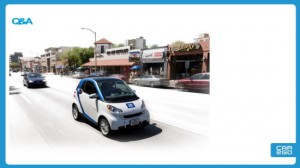
By John Addison (updated 7/16/10; original 5/20/10)
Zipcar Now Faces Major Competition from Auto Giant Daimler
Car Sharing has exploded in popularity in the U.S. with college students, one-car households, and with fleets. Until now, the car had to be returned to where it was picked-up. A new service – car2go – allows people in Austin, Texas to pick-up a car in one place and leave it in another, paying by the minute. The drop-offs are within a defined area.
During a 6 month pilot in Austin, 3,000 early members enjoyed the convenience of going from the Capitol to city center or university, saving time, money, and parking hassles. The pilot fleet started with 200 Smart Fortwo vehicles located throughout the greater downtown Austin area, accessible on-demand. Members check for the location of available cars using smartphones and web browsers. Due to the success of the pilot, the program is now expanded to 500 Smart Fortwos.
Members can take off at by-the-minute rates whenever they want without worrying about fuel, insurance, maintenance or even parking. Rentals can be completed in any available public parking space within the greater downtown Austin area or at one of the specially marked car2go spaces. A member survey showed that 95% of early users would recommend car2go and that 80% are very satisfied. Great numbers for a pilot.
Daimler, of course, makes and sells and leases Mercedes cars, Smart cars, buses, and trucks. Now it expands into car sharing with its subsidiary car2go. Daimler is positioning the Smart fortwo as the perfect vehicle for such a program. On May 21, 2010, car2go opened the program to all residents of Austin, Texas.
Can car2go catch Zipcar?
Zipcar is the world’s leading car-sharing service with more than 400,000 members and 7,000 vehicles in urban areas and college campuses throughout 28 North American states and provinces as well as in the United Kingdom. Nicholas Cole, CEO of car2go plans to expand into many U.S. cities and secure hundreds of thousands of members. Daimler sees the long-term possibility of millions of members. Imagine the potential of such a program to solve first mile /last mile connections between employers and major transportation centers such as rail and bus rapid transit stations. The success in over a dozen European cities of point-to-point bicycle sharing shows the potential of mobility on-demand.
For the convenience of drop-off freedom and per-minute pricing, car2go will price higher on an hourly basis than competitors such as Zipcar and Austin Car Share. Car2go offers a standard price of just 35 cents per minute plus tax which includes the costs of fuel, insurance, parking, maintenance, and mileage. With added time, the price drops. One hour costs a maximum of $12.99 plus tax and one day (24 hours) no more than $65.99 plus tax. There is no security deposit, monthly fees, or reservation costs. Per mile after 150 mile per rental 45 cents, plus tax.
The City of Austin and was recognized by the U.S. Environmental Protection Agency on May 20th for their outstanding efforts in reducing emissions. The Honorable Lee Leffingwell, Mayor of the City of Austin, praised car2go program for congestion relief in the city center and capital areas. 1,200 City of Austin employees have already joined the program. The Austin pilot was “jump started” with the City trading free parking spaces of a pool of free minutes in the car2go program.
The new car sharing program will be popular with government employees, corporate fleet managers, people living car free or sharing one car, and with college students. Car2go has a program for college and university students that has already helped University of Texas at Austin students live car free, using car sharing, transit, bicycling and walking.
The first pilot of car2go was in Ulm, Germany which now has 19,000 members. In Europe, Daimler also offers a battery electric Smart electric car which has been tested in a car2go pilot. They plan to include electric cars in the U.S. program in a few years. Cities will need an extensive public charging infrastructure to support such a program.
